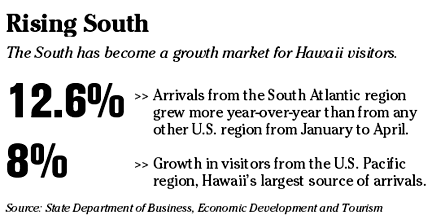
Reported by Star-Bulletin staff & wire
BACK TO TOP |
Japan Airlines may hike fares
Japan Airlines System Corp. and other member carriers of the International Air Transport Association may raise international fares by as much as 5 percent to help cover a surge in jet fuel costs.The proposed fare increase of between 2 percent and 5 percent was agreed at a Friday meeting of the association, which represents more than 270 airlines worldwide, IATA spokesman Anthony Concil said.
Profits at Japan Airlines, Asia's largest carrier, and other airlines are under pressure from rising fuel costs, threatening the industry's recovery from the Iraq war and a SARS epidemic that deterred people from traveling. Fuel prices are 55 percent higher than a year ago, boosted by a 40 percent increase in oil prices. That may increase airlines' costs by as much as $12 billion annually, Geneva-based IATA has said.
The last time Tokyo-based Japan Airlines raised fares on international routes was in April 2003, when jet fuel prices rose after the outbreak of the war in Iraq.
Some routes will be exempt from the increases, IATA's Concil said.
Ryanair has first loss since IPO
Ryanair Holdings Plc, Europe's biggest low-cost airline, posted a fourth-quarter loss, the first since the carrier sold shares to the public in May 1997, as it spent money adding new routes and ticket prices declined.The net loss in the three months ended March 31 was 3.3 million euros ($4 million), or 0.4 cents a share, compared with net income of 45.3 million euros, or 5.9 cents, a year earlier. The loss was narrower than the 11.8 million-euro median estimate of four analysts surveyed by Bloomberg News. Sales rose 16 percent to 222.8 million euros from 192 million euros.
Ryanair is having to cut ticket prices more than it had predicted to fill planes as competitors reduce fares. Shares of the Dublin-based carrier fell a record 30 percent on Jan. 28 after the company said annual profit will drop by as much as 10 percent following fare cuts of as much as a third.
South Korea's exports rise 42%
South Korean exports surged 42 percent in May, bolstering an economic recovery as domestic demand sags. Consumer prices unexpectedly fell, spurring optimism the central bank will keep interest rates at a record low to fuel growth.Exports rose to $20.9 billion from a year earlier after a gain of 37 percent in April, the commerce ministry said in a statement. Consumer prices fell 0.1 percent from April, the first drop in six months, the National Statistics Office said in a separate release in Seoul.
Growing global demand is fueling overseas sales by Samsung Electronics Co., Hyundai Motor Co. and other companies, which account for two-fifths of Asia's fourth-largest economy. Lower prices will enable the Bank of Korea to spur consumer spending by keeping borrowing costs at 3.75 percent when policy makers meet on June 10, economists said.
Nokia releases new camera phone
Nokia Oyj, the world's largest mobile-phone maker, started shipping a one-megapixel camera phone that plays videos and stores photos in an effort to regain lost market share from competitors such as Motorola Inc.The 7610 model will cost less than $611, when excluding subsidies and taxes, Nokia said in an e-mailed release. The one-megapixel resolution means users will be able to take pictures of higher quality than with Nokia's earlier camera-phone models.
Nokia, based in Espoo, Finland, lost market share in the first quarter as handsets from Motorola and Siemens AG with cameras and color screens gained in popularity. Nokia has reduced phone prices and plans to introduce 40 new models this year to recoup market share.
EU newcomers bring tax pressure
The European Union's newest members are using corporate tax cuts to win a bigger share of investment in Europe, and putting pressure on French President Jacques Chirac and German Chancellor Gerhard Schroeder to consider tax reductions to spur growth and increase employment.Companies are building factories and hiring workers in the eight Eastern European countries that joined the EU on May 1. The median tax rate in those nations is 19 percent, half that of Germany and compared with 34 percent in France.
"The days of high corporate tax rates are dead," said Rajeev Demello, who manages the equivalent of $7.3 billion in European bonds at Pictet & Cie in Geneva. "It's utopian to imagine tax competition won't intensify, triggered at least in part by falling corporate taxes in central and eastern Europe."
